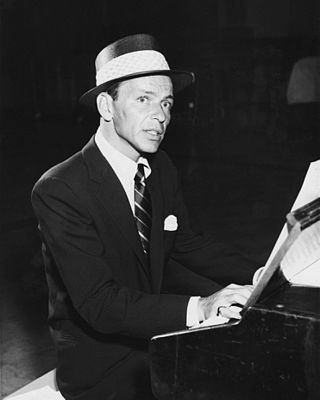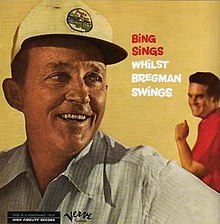
Harry "Sweets" Edison was an American jazz trumpeter and a member of the Count Basie Orchestra. His most important contribution was as a Hollywood studio musician, whose muted trumpet can be heard backing singers, most notably Frank Sinatra.
George Mortimer Roberts was an American trombonist.

The Count Basie Orchestra is a 16 to 18 piece big band, one of the most prominent jazz performing groups of the swing era, founded by Count Basie in 1935 and recording regularly from 1936. Despite a brief disbandment at the beginning of the 1950s, the band survived long past the Big Band era itself and the death of Basie in 1984. It continues under the direction of trumpeter Scotty Barnhart.
"I'm Getting Sentimental Over You" is a song recorded by Tommy Dorsey and His Orchestra. The words were written by Ned Washington and the music was written by George Bassman. It was first performed in 1932. The original copyright is dated 1933 and issued to Lawrence Music Publishers, Inc. The copyright was assigned to Mills Music, Inc. in 1934. Noni Bernardi, a saxophonist with the Dorsey orchestra arranged this song.
"Too Marvelous for Words" is a popular song written in 1937. Johnny Mercer wrote the lyrics for music composed by Richard Whiting. It was introduced by Wini Shaw and Ross Alexander in the 1937 Warner Brothers film Ready, Willing and Able, as well as used for a production number in a musical revue on Broadway. The song has become a pop and jazz standard and has been recorded by many artists.
"Pennies from Heaven" is a 1936 American popular song with music by Arthur Johnston and lyrics by Johnny Burke. It was introduced by Bing Crosby with Georgie Stoll and his Orchestra in the 1936 film of the same name.
"Makin' Whoopee" is a jazz/blues song, first popularized by Eddie Cantor in the 1928 musical Whoopee!. Gus Kahn wrote the lyrics and Walter Donaldson composed the music for the song as well as for the entire musical.

Louis Isidore "Buddy" Bregman was an American arranger and conductor.
"Love Is Just Around the Corner" is a popular song with music by Lewis E. Gensler and lyrics by Leo Robin, published in 1934. It was introduced in the 1934 Bing Crosby film Here is My Heart and was also included in the 1935 film Millions in the Air.
"Moonlight Becomes You" is a popular song composed by Jimmy Van Heusen with lyrics by Johnny Burke. The song was written for the Paramount Pictures release Road to Morocco (1942) and published in 1942 in connection with the film. Vic Schoen wrote the arrangement.
"But Beautiful" is a popular song with music written by Jimmy Van Heusen, the lyrics by Johnny Burke. The song was published in 1947.

Milt Bernhart was a West Coast jazz trombonist who worked with Stan Kenton, Frank Sinatra, and others. He supplied the solo in the middle of Sinatra's 1956 recording of I've Got You Under My Skin conducted by Nelson Riddle.
Paul Thatcher Smith was an American jazz pianist. He performed in various genres of jazz, most typically bebop, but is best known as an accompanist of singers, especially Ella Fitzgerald.
"I Wished on the Moon" is a song composed by Ralph Rainger, with lyrics by Dorothy Parker. Bing Crosby sang the song in The Big Broadcast of 1936.

Frank Sinatra's musical career began in the swing era in 1935, and ended in 1995, although he did briefly retire in 1971, before returning to music in 1973. Sinatra is one of the most influential music artists of the 20th century, and has sold 150 million records worldwide, making him one of the best-selling music artists of all-time. Rock critic Robert Christgau called Sinatra "the greatest singer of the 20th century". In addition to his music career, Sinatra was also a successful film actor, having won the Academy Award for Best Supporting Actor for his role as Private Angelo Maggio in From Here to Eternity (1953).
Alvin Stoller was an American jazz drummer. Though he seems to have been largely forgotten, he was held in high regard in the 1940s and 1950s. He was best known for playing drums on both Mitch Miller's recording of "The Yellow Rose of Texas" and Stan Freberg's parody of Miller's recording.
The following is the discography for big band and traditional pop arranger Nelson Riddle (1921–1985).
Pullman Gerald "Tommy" Pederson was an American trombonist and composer known for his work in jazz, big band, and classical genres.
This is a list of Bing Crosby songs he recorded twice or more during his career, excluding all of the 1954 re-recordings for Bing: A Musical Autobiography.

After Bing Crosby's long-term Decca Records contract was up, he signed many short-term contracts with a wide variety of labels. These included many popular labels such as Reprise, RCA, Verve, Decca (again), United Artists, Capitol and more.






